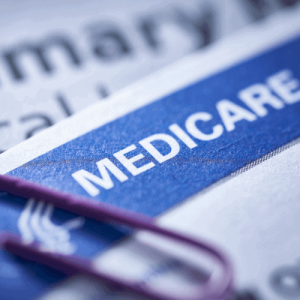 When it comes to home healthcare solutions, many seniors and families turn to medical alert systems for additional peace of mind. With features like 24/7 monitoring, fall detection, and GPS tracking, these devices help people maintain independence and feel more comfortable going about their daily activities. The at-home systems provide protection inside and around the house, whereas the one-the-go devices enable users to ask for immediate assistance at the touch of a button anytime, anywhere. However, life alert systems aren’t free of charge, and there are monthly subscription fees to be paid. Fortunately, the U.S. government runs a national insurance program called Medicare that occasionally helps citizens with the expense of getting medical alert devices.
When it comes to home healthcare solutions, many seniors and families turn to medical alert systems for additional peace of mind. With features like 24/7 monitoring, fall detection, and GPS tracking, these devices help people maintain independence and feel more comfortable going about their daily activities. The at-home systems provide protection inside and around the house, whereas the one-the-go devices enable users to ask for immediate assistance at the touch of a button anytime, anywhere. However, life alert systems aren’t free of charge, and there are monthly subscription fees to be paid. Fortunately, the U.S. government runs a national insurance program called Medicare that occasionally helps citizens with the expense of getting medical alert devices.
How Medicare Is Structured
Medicare provides health insurance for seniors and consists of four parts. The first two parts, A and B, fall under Original Medicare, while Part C and D are available through private health insurance companies. Part A is a type of hospital insurance that provides coverage for in-patient care and expenses at a medical institution. In contrast, Part B offers insurance for out-of-hospital treatments like clinical research and doctor visits. But a more comprehensive health insurance option known as Medicare Advantage or Part C is also available. It bundles hospital and medical insurance into a single medical aid for seniors. The last part of Medicare, Part D, is a prescription medication benefit provided to pensioners that need access to out-of-hospital prescription medication.
While the Original Medicare does not cover medical alert systems, a private health insurance company may reimburse the cost of getting one under Medicare Advantage. However, seniors may need proof from their doctors stating that the alert system is medically necessary before the health insurance company can consider covering it.

Medicare Advantage (Part C)
Medicare Advantage (MA) plans are acquired through private health insurance companies, which are approved to participate in the Medicare program. The most popular MA plans are Health Maintenance Organization (HMO), Preferred Provider Organization (PPO), Private Fee-for-Service (PFFS), and Medical Savings (MSA). On top of covering services included in Part A and B, Medicare Advantage also helps to pay for the usual doctors’ visits, medical equipment, and different kinds of therapy, not to mention dental, eye care, and hearing services.
Medicare Advantage plans can limit out-of-pocket medical expenses, lower copayments, and save money in the long run. To apply for an MA plan, it’s as easy as doing the following:
- Enroll in Original Medicare (Part A and Part B).
- Contact a Medicare-approved private insurance provider.
- Sign up for a Medicare Advantage plan during the enrollment periods: Initial Coverage Election Period (ICEP) and Annual Election Period (AEP).
The ICEP begins three months before enrollment in Original Medicare. It ends on either the last day of the month before signing up for Original Medicare or the last day of the Part B initial enrollment period. On the other hand, the AEP runs from October 15th to December 7th each year. For an average premium of $18 per month, seniors can enjoy all the benefits that come with Medicare Advantage plans. However, it’s worth noting that only a few Medicare-approved insurance providers, like Blue Cross Blue Shield (BCBS) and Humana, fully cover medical alert systems. BCBS provides seniors with a free Lively Mobile Plus alert unit, while Humana offers the Philips Lifeline system to older patients with congestive heart failure at no monthly cost.

Alternative Methods of Obtaining Medical Alert Systems
Medical alert systems don’t come cheap, but there are plenty of ways for seniors to get their hands on one without breaking the bank. First, contact medical alert companies to see if they provide any financial assistance. Pensioners may still need to pay a service subscription fee, but they can save money by not having to purchase an actual device. Another option is for seniors to downsize their homes to foot the alert system bill, which could also increase their cash flow and reduce monthly expenses. It’s also a good idea to look into Medicaid, which is a medical assistance program for low-income earners. It subsidizes the cost of medical alert systems for the elderly that meet certain criteria. Finally, it’s worth knowing that elderly veterans who served time in the military may also qualify for a free medical alert system from the Veteran Agency.
No one can put a price on safety, but getting a medical alert system shouldn’t have to cost anyone an arm and a leg. With the help of the national insurance program Medicare, seniors can afford life-saving emergency devices and take better care of themselves.
Best Medical Alert Systems of 2024
| Rank | Company | Info | Visit |
1 |
Editor's Choice 2024 |
|
|
2 |
|
||
| 3 |
|
More FAQs
- Bay Alarm Medical FAQ
- Does Medicare Cover Medical Alert Systems?
- How Do I Install a Medical Alert System?
- How Does a Medical Alert System Work?
- How Does Fall Detection in Medical Alert Systems Work?
- How Much Does a Medical Alert System Cost?
- Is a Medical Alert System Tax Deductible?
- What Is a Medical Alert System?
- Will My Insurance Cover My Medical Alert System?
Get the Best Deals on Medical Alert Systems
Let our experts keep you up to date on the latest trends, news and deals on medical alert systems.